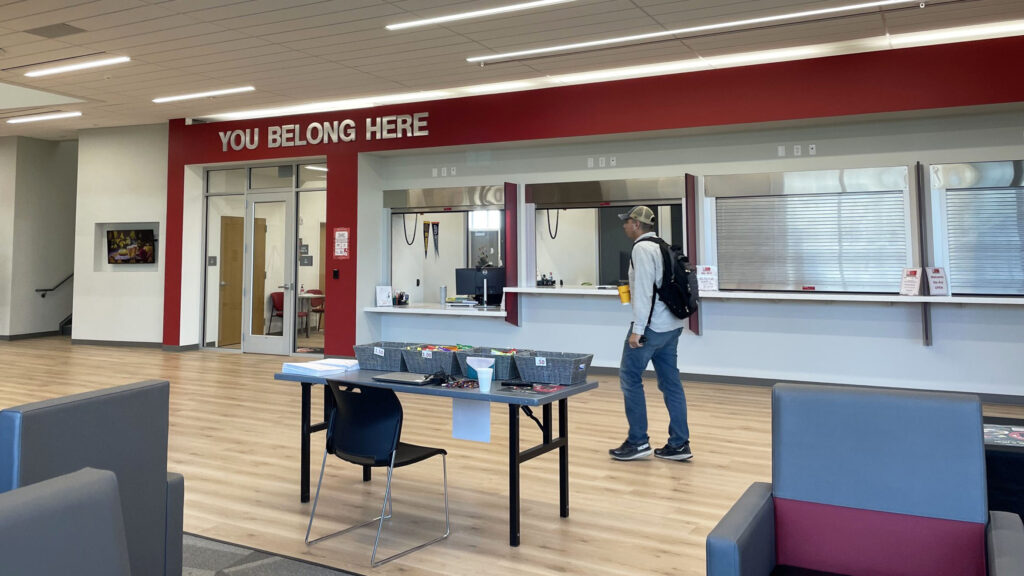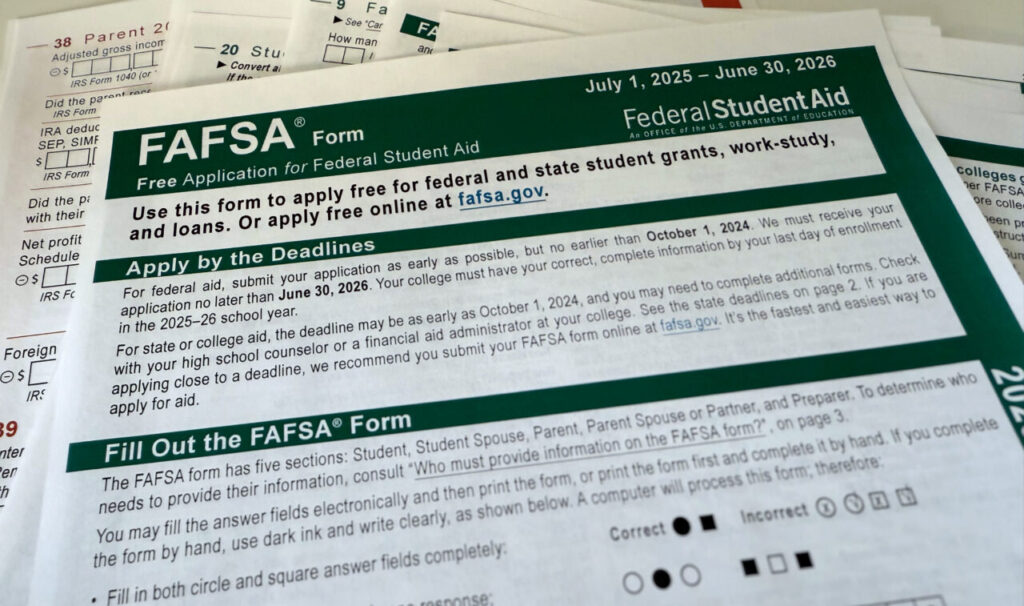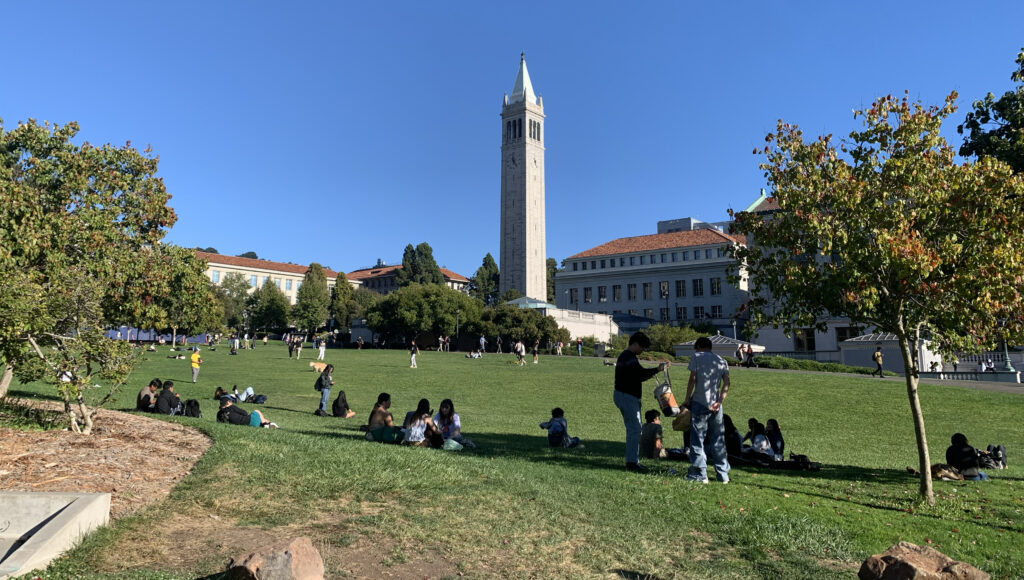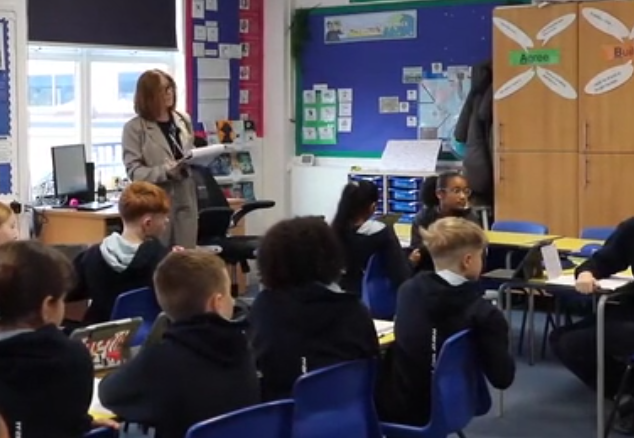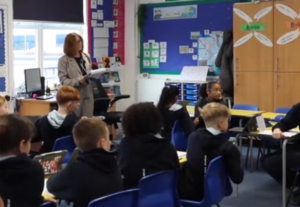
A student walks past the “You Belong Here” sign at Fresno City College’s newest campus, West Fresno Center.
Credit: Betty Márquez Rosales / EdSource
Brianna Knight can walk from her college campus down the street to her family’s home to check on her children when they need her, an option only recently available with the opening of Fresno City College’s latest campus in West Fresno.
Her family, longtime residents of West Fresno, often takes care of her children while she’s in class or working as a tutor on campus. Knight, who is completing her associate degree in human biology, said that working toward her degree was more stressful before the new campus opened.
She had planned to leave her hometown before the new West Fresno Center was built, she said, because she didn’t see a future there for her children. But her plans have changed now that the campus is open.
“I’m big on: Where can I plant my seeds for my kids to grow? And if my kids can’t grow somewhere, why am I here? And so to be able to have this in the community I grew up in … if my kids don’t want to leave, they don’t have to,” Knight said about the new campus.
For the West Fresno community that fought for this new campus, the college has come to symbolize hope for future generations like Knight’s children.

“West Fresno is a phoenix rising out of the ashes because we can fundamentally zero out a lot of the systemic issues that we’re experiencing if we center the voices of young people in our community,” said Eric Payne, executive director of the nonprofit Central Valley Urban Institute. “And what better place than a college campus?”
West Fresno is home to over 25,000 people in a historically marginalized section of the Central Valley’s largest city. It’s a region with one of the highest levels of concentrated poverty in the nation, higher rates of incarceration, and a lower life expectancy rate by about 20 years than their neighbors in wealthier sections of Fresno.
These statistics have solidified over decades with strategic redlining practices, documented in detail, since at least the 1930s, and have led to limited opportunities and resources for those raised in the area.
“Before, it was … just all about survival. There was no space to really grow. You don’t see a future, you don’t see yourself being a nurse,” said Knight, 33. “You hear about it, but you don’t actually get to see it.”
It’s an area so deeply understood by locals as being underserved that a high school graduate made the local news this year because she was valedictorian, despite growing up within 93706, West Fresno’s ZIP code.
“I can graduate with the highest honors despite the lack of resources and violence we endure on the West Side,” said Uzueth “Uzi” Ramírez-Gallegos during her speech, as reported by the Fresno Bee.
This history is why the newest Fresno City College location was thoughtfully chosen to be constructed within a 1- to 2-mile radius of more than 10 K-12 schools.
“We operated from a place of intention,” said Payne, who grew up in West Fresno and was elected trustee of State Center Community College District’s governing board in 2012. “How do we pull the greatest number of students into this community college?”
The answer to that question was twofold: Build the new college campus within walking distance of those K-12 schools, plus reach out to the students and staff at those very schools to draw them onto campus and eventually enroll in the courses.
The long-term vision for the college, Payne and campus leaders emphasized, is to create a space that not only disrupts the school-to-prison pipeline in the area but also more deeply connects West Fresno to the rest of the city.
“I think the location is perhaps the best decision that was made by the community members and administration to make sure that 93706 is no longer left behind,” said one such campus leader, Gurminder Sangha, dean of educational services at the West Fresno Center.
The 39 acres on which the school stands today were empty before its construction.

The financial backing for the acquisition of the land and construction of the facility was secured in a combination of ways: partial funding from a $485 million facilities bond approved by voters in 2016, a $16.5 million grant awarded by the city of Fresno through its Transformative Climate Community program, and an additional $11 million directly from the city.
Included in the mix was a donation of 6 acres from TFS Investments, a real estate investment firm that owned a portion of the land where the campus now stands.
The land has since been transformed into an open campus, with an automotive technology center opening in the new year, where students will train for certifications in electric vehicle mechanics and in the field of alternative fuels such as diesel technology.
The degrees and programs offered at the campus include access to medical assistant certifications, chemistry and biology laboratories, business administration courses, elementary teaching education training, and more.
There is also a newly-established city bus stop at the front entrance of the school on the previously existing route 38, with service every 15 minutes between 6 a.m. and 6 p.m. on weekdays.
Local community members have long expressed frustration over the unreliable public transit system. The new stop and the accompanying free bus passes available for students are meant to increase accessibility to and from the campus.
Perhaps most clearly bridging the new campus to its local West Fresno community is the one-mile walking trail with exercise equipment circling the campus, which will be open to all once construction is finished.
The amenities and services offered at the new campus are in contrast with the larger West Fresno community, where essentials like grocery stores, banks and even trees are uncommon. In light of this contrast, the school is becoming a haven for many. Knight, for example, noted that her children enjoy walking from their home up the street and onto the campus.
Those who enter the campus’ main lobby are greeted by both staff and peers who are hired to work in the student services department housed on the first floor of the same building where many of the college’s academic courses are offered.
From counseling to basic needs resources and financial aid to records, students can easily find the right person to speak with because those offices are one of the first things they see as they walk into the lobby. The clearest welcome might just be the large lettering above those offices, which reads: “You belong here.”

Barring the sections of campus remaining under construction through the beginning of next year — the automotive center and the walking trail — it is difficult to believe that the school opened just this fall; the facility has the typical hum of a college campus. Some students take their mid-class breaks in the main lobby, which doubles as a student lounge area, complete with snacks available for purchase and soft classical music playing in the background.
Others study in the academic support centers on the second floor, where they also have a clear view of the greater West Fresno community.
Sangha expects the available resources will expand as the school community grows.
Conversations around building the campus began nearly two decades ago, said Sangha, with the actual construction taking about two years to complete.
Payne noted that he remembers hearing about a college being established in West Fresno when he was in high school over two decades ago, but “it never materialized,” so he left Fresno at the time to attend Alabama A&M University.
When he returned to his hometown years later, he began organizing with his former neighbors and joined a movement to push for what eventually became West Fresno Center. If it had existed when he was in high school, he said he may have chosen to stay in the city where he grew up and that more of his peers might have had better life outcomes and opportunities.
“There are a lot of people that I graduated with that are deceased, that are incarcerated, and a lot of folks who are barely making it financially,” he said. “There was a thirst for this facility; there was a thirst for better outcomes.”
That thirst is slowly being reflected in the number of students enrolling from the West Fresno community. Out of the 800 enrolled during this first fall semester since its grand opening, 130 students are exclusively taking courses at this campus, about 125 live in the 93706 ZIP code, and about 160 live in 93722, the ZIP code just north of campus.
With their doors now open, plans are in place to offer college credit to local high school students. At three nearby high schools — Edison, Washington Union, and Kerman — students are already in dual enrollment courses held at their high school campuses. Sometime next year, according to Sangha, West Fresno Center plans to offer courses for high school students at the college campus so they may earn additional credits.
“It is truly an academic village in a way, in that students can envision themselves walking from one school to the other school, then coming to us and going to Fresno State or wherever they want to go,” said Sangha.
Knight graduated from high school about 15 years ago and moved to Los Angeles to enroll in Santa Monica College, but her move coincided with the 2008 recession and she couldn’t afford to remain in L.A. She returned to Fresno and enrolled in Fresno City College, but left shortly after becoming pregnant.

“My journey to school has been … it’s been very different,” she said. “I’ve tried to come back throughout the years, and I just don’t think I was ready.”
During the pandemic, she enrolled in school once more. She said the support she has received at the center made a significant difference for her.
“My professors actually care that I show up, whether I’m late or whether I have to leave and take care of my kids or come back — which doesn’t happen often, but the fact that I have that support is important,” she said.
Knight, who is a Fresno Unified School District graduate and whose mother and grandmother worked at Fresno Unified schools, now plans to continue raising her children in West Fresno. She is completing her degrees in human biology, public health and pre-allied health this month and will be walking the graduation stage in May.
“To live across the street and to see it being built from the ground up, that was everything to me,” said Knight, a mother of two who is pregnant with twins. “It changed my whole mindset on Fresno, to be honest with you.”
